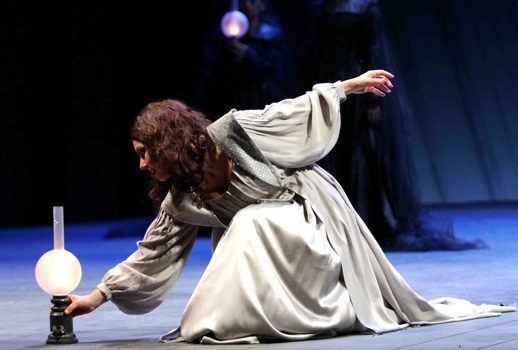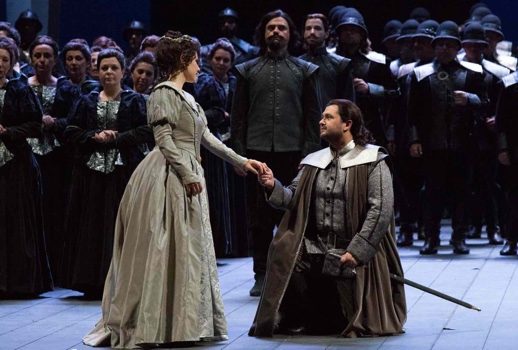

Have you ever stood in a mountain stream, exhilarating froth bursting at you from every side?
April brought I Puritani to Palermo’s centerpiece Teatro Massimo. The final masterpiece of Sicily’s national composer is no rare visitor here, of course.
Opening night, last Friday, was packed, the performance broadcast on RAI. Puritani, notoriously, requires a star quartet; impressive as it was that the company had them (especially as the original Elvira had fallen sick), the following night, Saturday, starred four different singers. The house was just as full. Two subsequent performances are to be livestreamed.
Have you ever stood in a mountain stream, exhilarating froth bursting at you from every side? I Puritani is like that. The froth is Bellini’s melody, and it seems inexhaustible as springtime floods in the crescent of green peaks that embraces Palermo, best seen from the opera house roof. But in less than a year from the premiere, the composer was dead, not yet 34.
Given that brief time, the existence of several variants of the score is a puzzle. Were changes made before or after the premiere in Paris? There’s the Naples version for mezzo, lowered for Malibran but apparently never used until von Stade—or was it Bartoli?—discovered it. There’s the optional soprano cabaletta that conductors who shall be nameless (or, should I say, Mute?) omit in the stern belief that it was an alien afterthought. There’s the trio that turned up in Bologna a few years back, introduced by Juan Diego Florez, though it had been cut by Bellini before opening night in 1835.
The autograph of the score was on display in the entrance hall of the Massimo, so you’d think they’d hew to the familiar and simple. But no. It was straight Puritani for the first two acts (naturally, the leads ornamented the line whenever they cared to do so), but in the third act (with its somewhat optional high notes, but forget them, they weren’t on display) eccentricities crept in.
There was a two-verse love duet, “Mi credevi si spergiuro,” that I don’t recall having heard before, right in the middle of the big love duet in case anyone didn’t think that was long enough already. It’s a pretty tune, but what is it doing here, saying nothing that hasn’t been said already?
Then there’s the notorious cabaletta finale, “Dagli affanni al gaudio,” after the last-possible-second enter-a-messenger happy ending. This was sung, all right, and repeated (with frills), but not by the soprano alone—by the soprano and the tenor together. This is new to me. Is it written as a duet, but some divas insisted on having the final word? Or is it a duet often in European houses? Which is the real Vincenzo? Someone in Parterre-land will know the answer.

Act II is set in an Art Nouveau castle hall, Elvira attended by six grey ladies carrying glass-chimneyed Victorian oil lamps—are they her attendants or figments of her imagination, and did such lamps exist in Cromwell’s day? But they are needed so that mad Elvira can carry such a lamp in Act III through the forest backdrop, singing love’s old sweet song. The greenwood rises to a set of swords again, and the swords—did you guess? I did—rise and vanish with the happy end against a shimmering heaven.
It was, in other words, basic. The producer, Pierluigi Pier’Alli, directed traffic. It was up to the singers’ quartet to save it or sink it.
The prima went to Laura Giordano, a Palermo native and favorite. Giordano has a very pretty voice, cool and well placed, with some potentially big notes. What she has not got is solid notes above the staff, and when she tries to “sell” them, they slice painfully. She addresses the difficulty by offering so much intricate coloratura below that top as to dazzle and distract our expectations. After one or two unhappy top notes in Act I, I was glad to forego them thereafter, and “Qui la voce,” for instance, does not require such things. She sang it beautifully and went low on the cabaletta.
More to my taste was Ruth Iniesta on Saturday. The voice is larger, the high notes clear and unforced—and she loves to sing them. She seemed more involved in the character, too; she played with the veil as a symbol of her dreams come true where Giordano carried it in like pots she was going to transplant. Iniesta is a persuasive vocal actress with restrained power, let out as needed. “Vien, diletto, e in ciel” was delicious. And she had relationshipswith every other character on stage.
The opening night Arturo was Celso Albelo, something of a rising star. It’s a big voice, well produced and attractive, but he has a way of rushing to the footlights to trumpet a B or C that aroused some cheers and one audible boo. I get it: He thinks he’s Corelli (who never stepped out of character in this way, and certainly didn’t need to hop the footlights to fill the house), but such antics seem provincial.
Albelo sang “A te o cara” and “A una fonte” with great clarity and youthful vigor, but he seems to be unaware of legato or the floating line. He blended well with Giordano; one can happily imagine them in, say, Ballo in Maschera. I wouldn’t care to hear him sing Bellini again, but Verdi and Puccini might suit him well.
On the second night, in contrast, Shalva Mukeria knew exactly what Bellini was about, with a poised, flowing line, gracious in duet, a bit too forceful in some notes written for head voice (like Albelo, he made lower choices), but providing an immensely musical and satisfying performance.
On Friday, Nicola Ulivieri sang Sir Giorgio with a fine conception of bel canto grace and an engaging, paternal flow of dark sound. The kindliness of his care for Elvira was palpable. On Saturday, Ugo Guagliardo was uninteresting in this role.
I’ve left the baritone, Riccardo, for last because, on opening night, he was my favorite. (Could you tell?) Julian Kim, who hails from Seoul, was the most Italian of Friday’s quartet. It was a voice to express passion, regret, warlike vigor, subtly, through phrasing to let the feelings shine through. “Ah! Per sempre io ti perdei” was no toss-off but a superb presentation of Bellinian melody.
Too, Kim filled the house without varying in serene bel canto emphasis: He effortlessly drowned out Ulivieri in “Suoni la tromba,” and the famous duet drew enthusiastic cries of “Bis!” The maestro, Jader Bignamini, folded his arms across his chest and waited us out. (Live radio broadcast is a harsh mistress.) Kim is a singer I’d be delighted to encounter in any Donizetti or Verdi baritone role. He could go the distance.
Saturday’s Riccardo, Giorgio Caoduro, in contrast, has a dry, colorless voice, the kind that hectors rather than persuades. His fioritura is remarkable, fast and vigorous and unattractive. At the end of Act II, he held his fire for one big note (and it was his best note of the night), and the house was unimpressed. No “Bis” this time.
Bignamini led the score with the proper rhythmic impetus and, at quieter moments, romantic languor. Toes were tapping at “Suoni la tromba,” and all the singers seemed to delight in their long and elaborate assignments. The chorus, in their formal blocking, produced some exquisitely delicate dynamics. Everyone’s diction was exceptional. And the soldier who couldn’t get his sword out of its scabbard precisely on the beat (with all the others) and shoved his fist out instead earned my admiration.
Puritani is tough to cast at full strength. A top quartet of principals is rare. Last time I heard it in New York, Pretty Yende and Javier Camarena were delectable, but the other two gents, fine singers both, made no impression. In Palermo, I was thrilled to encounter Iniesta, Mukeria and Kim, enjoyed much of the singing from the others—and am struck that two full quartets (and four Elviras, counting Jessica Pratt, who arrives Tuesday,and the indisposed Sierra) were on offer.
Photos: Rosellina Garbo
























Comments